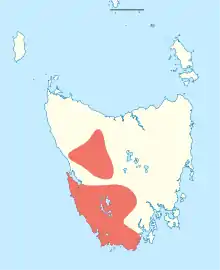Actinotus suffocatus
Actinotus suffocatus, the crimson flannelflower,[2] is a small, perennial herb endemic to the Australian State of Tasmania.[3] It is primarily found in high-elevation habitats in wet situations, except in the far south-west of the island, where it occurs down to sea level in continually moist habitats.[4]
| Actinotus suffocatus | |
|---|---|
| Scientific classification | |
| Kingdom: | Plantae |
| Clade: | Tracheophytes |
| Clade: | Angiosperms |
| Clade: | Eudicots |
| Clade: | Asterids |
| Order: | Apiales |
| Family: | Apiaceae |
| Genus: | Actinotus |
| Species: | A. suffocatus |
| Binomial name | |
| Actinotus suffocatus | |
 | |
| Synonyms[1] | |
|
Hemiphues suffocata Hook.f. | |
Taxonomy
Actinotus suffocatus was described originally as Hemiphues suffocata by Joseph Dalton Hooker from plants gathered by R.C.Gunn at Fatigue Hill (nowadays Calders Lookout), near Mount Arrowsmith, in central western Tasmania,[5] and later transferred by Leonard Rodway to the genus Actinotus.
Description
Actinotus suffocatus is a small, rhizomatous, mat-forming perennial herb with leaves in a basal rosette and a cup-shaped inflorescence of sessile flowers on a short, erect scape.
References
- APNI. "Actinotus suffocatus Hook.f." Australian Plant Name Index. Retrieved 8 May 2018.
- Wapstra, H; Wapstra, A; Wapstra, M; Gilfedder, L (2005). The Little Book of Common Names for Tasmanian Plants (PDF). Hobart, Tasmania: DPIPWE. ISBN 0-7246-6365-7. Retrieved 7 May 2018.
- de Salas, M. F.; Baker, M.L. (2017). A Census of the Vascular Plants of Tasmania, including Macquarie Island (PDF). Hobart, Australia: Tasmanian Museum and Art Gallery. p. 7.
- Curtis, W.M. (1963). The Student's Flora of Tasmania, Part 2. Hobart, Tasmania, Australia: Government Printer. p. 254.
- Hooker, J.D. (1847). "Florae Tasmaniae Spicilegium". London Journal of Botany. 6: 471.
